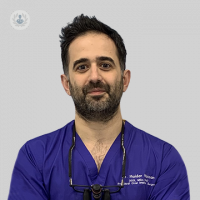Wisdom tooth removal: everything you need to know
Written by:Wisdom teeth are the third set of molars that typically emerge between ages 17 and 25. They often cause issues due to lack of space, leading to pain, crowding and infections. Dentists may recommend removal if they pose problems. Leading principal oral implant surgeon Dr Haidar Hassan explains all you need to know about wisdom tooth removal.

How are wisdom teeth removed?
Wisdom teeth are typically removed through a surgical or non-surgical procedure performed by an experienced dental/oral surgeon. The choice of procedure depends on the complexity of the wisdom tooth. The procedure involves numbing the area with local anaesthesia.
The surgical procedure is performed by making an incision in the gum tissue to expose the tooth. It may be necessary to remove the bone that blocks access to the tooth. The tooth is then extracted either in one piece or divided into smaller pieces for easier removal. After the tooth is removed, the surgical site is stitched closed, and gauze is placed over the area to control bleeding.
When do wisdom teeth absolutely need to be removed?
- Pericoronitis, or repeated infections of the gum around a wisdom tooth, is the primary cause.
- Decay affecting the wisdom tooth itself, which cannot be treated with a filling.
- Decay in the tooth adjacent to the wisdom tooth.
- Abscess formation at the base of the wisdom tooth's root.
- Formation of a cyst, a fluid-filled sac, around the wisdom tooth.
- Removal as part of jaw-related surgeries where the wisdom tooth obstructs the procedure.
How long does it take for wisdom teeth to be removed?
The duration of the wisdom teeth removal procedure depends on several factors, including the number of teeth being removed, their position, and whether they are impacted. On average, the procedure takes about 30 minutes to an hour per tooth. However, it may take a longer time for more complex cases.
Is the procedure painful?
The procedure itself is not painful as the area is numbed with local anaesthesia. Patients may feel pressure or slight discomfort during the extraction process, but they should not experience pain. Following the procedure, patients may experience some discomfort and swelling, which can be managed with pain medication prescribed by the dental/oral surgeon.
What does recovery time entail? What should I avoid doing immediately after?
Recovery from wisdom teeth removal typically takes about a few days to a week. During this time, it's important to follow post-operative care instructions provided by your dental/oral surgeon. This may include:
- Following the instructions for prescribed pain relief medication.
- Consuming soft foods and avoiding hard, crunchy, or spicy foods that could aggravate the surgical area.
- Avoiding strenuous activities and exercise for the first few days.
- Refraining from smoking or using a straw, as this can dislodge blood clots and delay healing.
It's essential to attend follow-up appointments with your dental/oral surgeon to monitor the healing process and address any concerns. If you experience excessive bleeding, severe pain, or signs of infection such as fever or swelling, contact your dental/oral surgeon immediately.
If you require wisdom tooth removal and would like to book a consultation with Dr Hassan, do not hesitate to do so by visiting his Top Doctors profile today.


